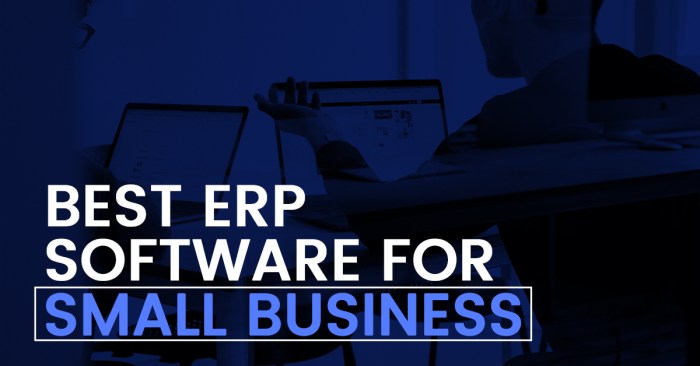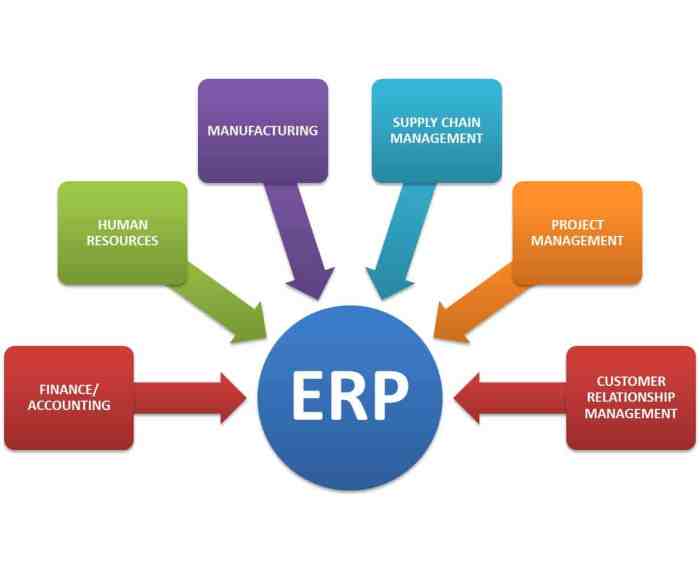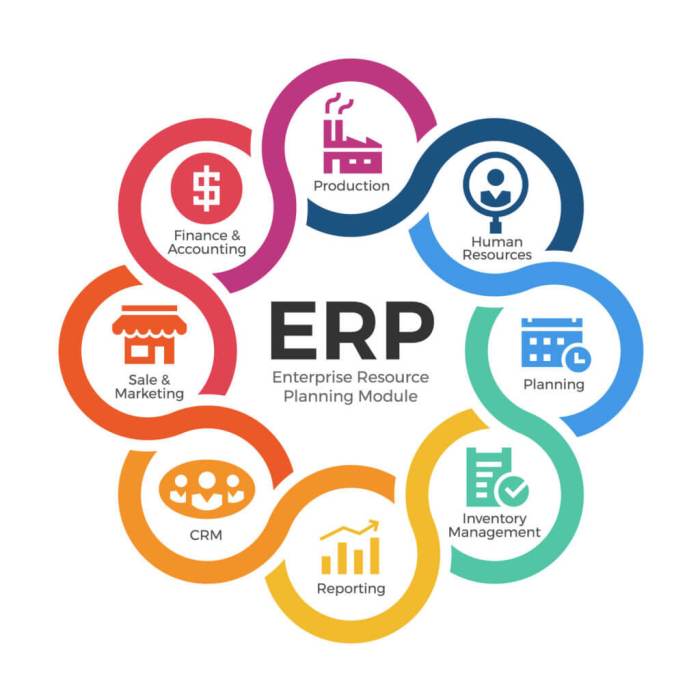ERP software for small businesses with limited budgets is a game-changer. It empowers businesses to streamline operations, manage finances effectively, and make informed decisions, all without breaking the bank. Imagine a single platform that consolidates your inventory, sales, and customer data, providing a holistic view of your business. This is the power of ERP, and it’s accessible to even the smallest enterprises.
This guide explores the benefits of ERP software for small businesses, providing practical tips for choosing, implementing, and maximizing its potential. We’ll delve into key features, affordable solutions, and real-world examples of successful implementation, highlighting the impact ERP can have on your growth and efficiency.
The Need for ERP Software in Small Businesses

Small businesses are the backbone of many economies, but they often face significant challenges in managing their operations, especially those with limited budgets. These challenges can range from inefficient processes to a lack of visibility into their financial performance. This is where ERP software can play a crucial role in helping small businesses overcome these hurdles and achieve sustainable growth.
Addressing Challenges with ERP Software
ERP software is a comprehensive system that integrates various business functions, including finance, inventory, sales, and human resources, into a single platform. This integration streamlines operations, improves efficiency, and provides valuable insights into business performance.
- Improved Inventory Management: ERP software helps small businesses track inventory levels in real-time, preventing stockouts and overstocking. It also automates purchase orders and optimizes inventory replenishment, reducing storage costs and improving cash flow.
- Streamlined Sales and Order Processing: ERP software automates the sales process, from order entry to invoicing and payment processing. This reduces manual errors, speeds up order fulfillment, and enhances customer satisfaction.
- Enhanced Financial Management: ERP software provides real-time financial data, enabling small businesses to track their revenue, expenses, and profitability. It also facilitates budgeting, forecasting, and financial reporting, making it easier to make informed financial decisions.
- Improved Customer Relationship Management: ERP software helps businesses manage customer interactions and track customer data. This enables personalized communication, improved customer service, and increased customer retention.
- Increased Efficiency and Productivity: By automating repetitive tasks and providing access to real-time information, ERP software empowers employees to work more efficiently and productively. It also reduces the need for manual data entry and eliminates errors, freeing up valuable time for more strategic tasks.
Implementing and Integrating ERP Software

Implementing an ERP system in a small business requires careful planning and execution to ensure a smooth transition and maximize the benefits of the software. This process involves a series of steps that should be approached systematically to avoid disruptions and ensure successful adoption.
Data Migration
Data migration is a crucial step in ERP implementation. It involves transferring data from existing systems, such as spreadsheets, accounting software, or databases, into the new ERP system. This process requires meticulous planning and execution to ensure data accuracy and integrity.
- Identify Data Sources: The first step is to identify all relevant data sources, including spreadsheets, databases, and legacy systems.
- Data Mapping: Once data sources are identified, map the data fields from the existing systems to the corresponding fields in the ERP system. This step ensures data consistency and avoids errors during migration.
- Data Cleansing: Before migrating data, it’s essential to cleanse and validate the data for accuracy and completeness. This step involves identifying and correcting errors, inconsistencies, and duplicates.
- Data Transformation: Data may need to be transformed to match the ERP system’s data format and structure. This may involve converting data types, units, or currencies.
- Data Loading: After data cleansing and transformation, the data is loaded into the ERP system. This step can be done manually or through automated tools.
- Data Verification: After loading data, it’s essential to verify the accuracy and completeness of the data in the ERP system. This step involves comparing the data in the ERP system with the source data.
User Training
Providing adequate user training is essential for the successful adoption of an ERP system. It ensures that users understand the system’s functionalities, navigate the interface effectively, and utilize the software to its full potential.
- Needs Assessment: Before starting training, assess the user’s technical skills, experience with ERP systems, and specific roles within the business. This will help tailor training programs to meet individual needs.
- Training Methods: Offer a variety of training methods, such as online tutorials, classroom sessions, and hands-on workshops. This caters to different learning styles and preferences.
- Practical Exercises: Include practical exercises and simulations to allow users to apply their knowledge and gain hands-on experience with the system.
- Ongoing Support: Provide ongoing support and resources to users after initial training. This could include FAQs, user manuals, online help desks, and dedicated support staff.
Ongoing Support and Maintenance, ERP software for small businesses with limited budgets
Ongoing support and maintenance are essential for ensuring the ERP system’s smooth operation and maximizing its value. This involves providing technical assistance, resolving issues, and updating the system to keep it secure and efficient.
- Technical Support: Provide technical support to users to address issues, troubleshoot problems, and answer questions.
- System Updates: Regularly update the ERP system with the latest patches, security fixes, and feature enhancements.
- Data Backup: Regularly back up the ERP system’s data to protect against data loss.
- Performance Monitoring: Monitor the system’s performance and identify any bottlenecks or issues that need to be addressed.
- User Feedback: Regularly gather user feedback to identify areas for improvement and enhance the system’s usability.
The Benefits of ERP Software for Small Businesses

While the initial investment in ERP software might seem daunting for small businesses with limited budgets, the long-term benefits are undeniable. ERP software can streamline operations, improve efficiency, and ultimately lead to increased profitability.
Increased Efficiency and Productivity
ERP software centralizes all business processes, eliminating the need for manual data entry and reducing the risk of errors. This automation frees up valuable time for employees to focus on more strategic tasks, leading to increased productivity.
Improved Data Management and Reporting
ERP software provides a single source of truth for all business data, making it easier to track and analyze performance. This improved data management enables businesses to generate insightful reports that can help identify areas for improvement and make better decisions.
| Benefit | Description |
|---|---|
| Real-time data access | ERP systems provide access to real-time data, enabling businesses to make informed decisions based on the latest information. |
| Improved data accuracy | Centralized data management reduces the risk of data duplication and inconsistencies, ensuring data accuracy. |
| Enhanced reporting capabilities | ERP software offers robust reporting features, allowing businesses to generate customized reports for various purposes, such as financial analysis, sales performance, and inventory management. |
Enhanced Customer Service and Satisfaction
ERP software can help businesses improve customer service by providing a centralized view of customer interactions and orders. This allows for faster response times, personalized service, and improved communication.
- Faster order fulfillment: ERP software automates order processing, reducing lead times and improving customer satisfaction.
- Improved communication: Centralized customer information enables businesses to provide personalized and consistent communication across all channels.
- Increased customer satisfaction: By providing a seamless and efficient customer experience, businesses can improve customer satisfaction and loyalty.
Reduced Costs and Operational Expenses
ERP software can help businesses reduce costs by automating processes, eliminating manual tasks, and improving efficiency. This can lead to significant savings in labor, inventory, and other operational expenses.
- Streamlined inventory management: ERP software optimizes inventory levels, reducing storage costs and minimizing waste.
- Automated processes: Automating repetitive tasks like invoicing and payroll reduces the need for manual labor, leading to cost savings.
- Reduced errors: Automation minimizes human error, reducing costs associated with rework and wasted resources.
Enhanced Decision-Making and Strategic Planning
By providing real-time data and insights, ERP software empowers businesses to make informed decisions based on accurate information. This improved decision-making capability enables better strategic planning and helps businesses achieve their goals.
- Improved forecasting: ERP software provides historical data and analytics to help businesses forecast future demand and plan accordingly.
- Data-driven insights: ERP software provides insights into key business metrics, enabling businesses to identify trends, opportunities, and potential risks.
- Better resource allocation: Data-driven insights from ERP software allow businesses to allocate resources more effectively, maximizing efficiency and profitability.
Investing in ERP software is a strategic decision that can transform your small business. By embracing technology and leveraging the right tools, you can unlock new levels of efficiency, improve decision-making, and gain a competitive edge. As the landscape of ERP continues to evolve, staying informed about emerging trends and embracing solutions that adapt to your future needs will be crucial for sustained success.
Detailed FAQs: ERP Software For Small Businesses With Limited Budgets
What are the common challenges faced by small businesses with limited budgets?
Small businesses often struggle with limited resources, manual processes, lack of visibility into operations, and difficulty managing data effectively. These challenges can hinder growth and profitability.
How can ERP software help small businesses with limited budgets?
ERP software offers affordable solutions that streamline processes, improve data management, and enhance decision-making. It helps businesses automate tasks, reduce manual errors, and gain insights from their data, ultimately improving efficiency and profitability.
What are some affordable ERP software options for small businesses?
There are numerous affordable ERP options available, including cloud-based solutions with subscription models, open-source software with minimal licensing fees, and specialized ERP software designed specifically for small businesses.